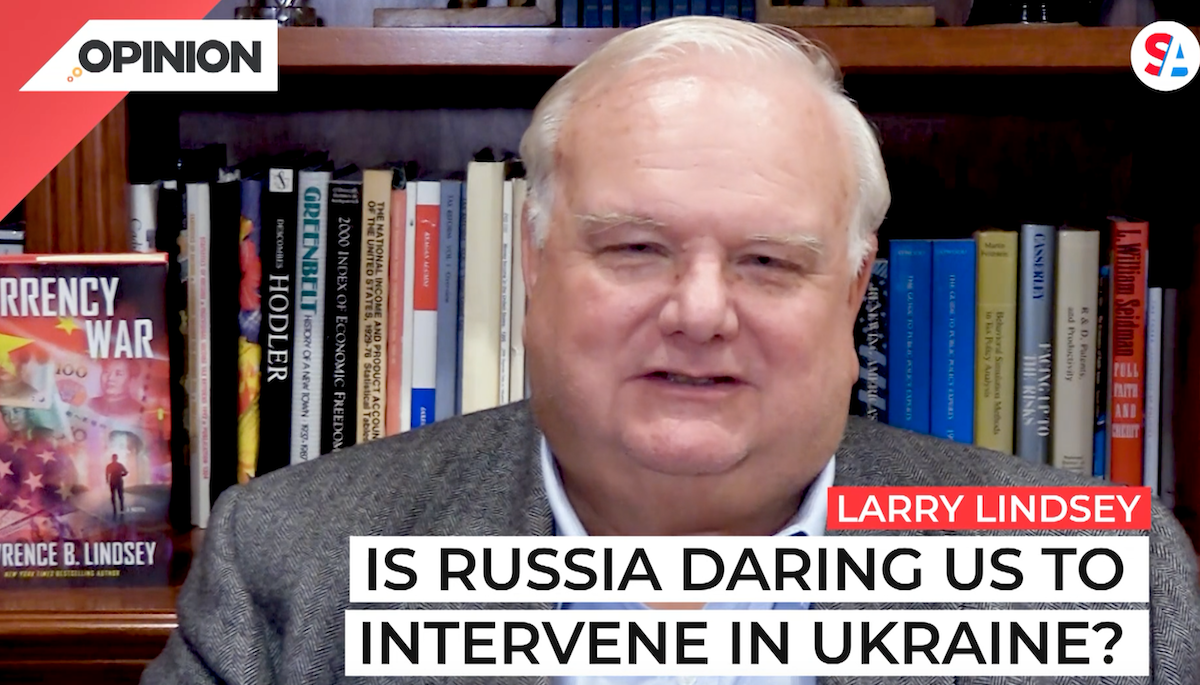
Commentary
-
Our commentary partners will help you reach your own conclusions on complex topics.
How should America deal with Russia’s Ukraine aggression? By following Teddy Roosevelt’s advice
More than a century ago, president Teddy Roosevelt, left a line in American legacy on how to conduct foreign policy. He said, walk softly, but carry a big stick.
Well, unfortunately, some of his successors haven’t quite followed that advice. And we’re seeing that again with regard to Ukraine, which used to be part of the Soviet Union, AND is now an independent country, but now has Russia. The new Soviet Union amassing troops on its borders. Well, what policy should the U.S. follow with regard to Ukraine? It’s complicated.
And it goes down into history. Back in the cold war, with Ukraine, part of the Soviet Union, when the west and America beat the Soviet Union and the Berlin wall came down, we thought the war and the conflict with Russia was over and we thought it ended well. Well, president Putin and his generation viewed it as a enormous embarrassment that they had lost the cold war.
And in fact, Russian military assumes that we’re still at war. They think of U.S.-Russian relations, not as a hot war level, but continuing the cold war. And Ukraine is a centerpiece of this. It’s long been part of Russian history that their best defense is having lots of territory surrounding them. Most of Russia, particularly Western Russia is simply flat and not a lot of natural barriers. So that’s why they wanted the extra territory. And in fact, it was Catherine the great in the late 1700s who annexed Ukraine, also the Baltics in other parts of Russia. So Ukraine has been part of Russia since the American Revolution. And so it’s quite natural for people in Moscow to think it belongs there. And Putin is no exception. Well, how would we quote, protect Ukraine? Well, one of the ideas at first was why don’t we incorporate them into some of the Western alliances, for example, NATO or the North Atlantic Treaty Organization or the European Union?
Well, neither of those worked out, probably for good reason. Instead, the United States and Britain signed an agreement that they would jointly respect and protect the territorial integrity of Ukraine in return for which Ukraine was going to decommission all the nuclear weapons that were there from Soviet times. Well, that was a great commitment, a written, a written treaty basically, and then came 2014 and Putin took a part of Ukraine, the Crimean peninsula, and incorporated it into Russia. Well, President Obama and other Western leaders said, this will not stand well. It’s still standing. And the U.S.-Ukraine security G was proved to be worthless. That was the case of not following Teddy Roosevelt’s advice. We overcommitted and we didn’t have a big stick. We ran away. So needless to say Putin and the Russians learned the right lesson from this in their minds.
The Russian military doctrine is quite aggressive in Russian military doctrine. They have the idea of a limited nuclear war…could be an exchange of a few level, smaller nuclear weapons on the back afield with the implicit threat that it could escalate. In fact, their theme is escalate in order to de-escalate, meaning a minor escalation will make the opponent, i.e. us, back down and run away. And then the conflict will be de-escalated, but it’s kind of what happened with regard to Crimea. Well, the Russians not only took Crimea, but they’ve also taken the Northern part of the old Republic of Georgia, as well as Armenia and incorporated that into their country. Their next move is going to be on Moldova and that leads to the Balkans. So the Russians actually are the ones who have figured out that they can get away with things.
And, and this is going to be a problem for us. Well, going forward, the Russians are not just going to try to scare us with the use of small nuclear weapons, but they’ve got a few other aggressive policies. For example, they host a lot of hackers. It is legal in Russia to be a hacker unless you hack Russians. So it was Russian hackers who shut down the colonial pipeline and did oil and gas deliveries to a good part of the east coast earlier this year. Another thing that they have just developed is a new space weapon. The U.S. space command announced that the Russians succeeded in shooting down one of their old Soviet-era satellites by launching a missile at well, the Russians weren’t just trying to get rid of space junk. They were pointing out that they can shoot us down as well.
And the United States is much more vulnerable, much more dependent on our satellites than anybody else. For example, all our civilian and military GPS systems rely on those satellites. They’re only about two dozen of them up there. They could completely blind the United States simply by shooting one down. Those are the three threats that Russia now poses. We know it, and our administration is unlikely to take any serious action.
Should the Russians move forward? So in April of this year, Putin told the Russian parliament that any react action by NATO or America would be met with swift asymmetric and harsh response. That doesn’t sound much like a guy who is interested in long run peace with America, quite the opposite. He is the one who’s carrying a big stick and he knows it. This is Larry Lindsay straight arrow news.
-
Election 2024 will boil down to the Great Lakes states
Pollsters and pundits have been engaged in a long debate about how Biden or Trump might win the 2024 election, with much of their focus spent on the “swing state” electoral battlegrounds. While the winners of Alabama or California may be obvious, for instance, who wins Pennsylvania is a more difficult question. Watch the above… -
Why the Fed should consider Theory of Reflexivity when fixing policy
The Theory of Reflexivity, often used in the context of economics and financial markets, implies that investors don’t base their decisions on reality but on their perceptions of reality. This creates a feedback loop where investors’ perceptions influence economic fundamentals, which in turn alter investor perceptions. Watch the above video as Straight Arrow News contributor… -
Federal Reserve surpassed its own wildest expectations
On May 14, the U.S. Bureau of Labor Statistics released the most current producer price index (PPI) report, which showed an increase of 0.5% month-over-month in April. After the report’s release, U.S. Federal Reserve chairman Jerome “Jay” Powell said that while he believes the current policy rate is restrictive by many measures, the Fed needs… -
Polls give slight advantage to Trump in Electoral College
With the U.S. general election only six months away, leading candidates President Joe Biden and former President Donald Trump appear to be engaged in a very close contest. In their 2020 race, the winner of the Electoral College was ultimately determined by a relative handful of voters in just a few swing states, even though… -
College sports is big money but not everyone benefits
March Madness has wrapped up and Caitlin Clark has emerged as a household name as well as a wealthy student athlete. Earning over $3 million throughout her college career, her success stands in stark contrast to the previous notion that collegiate athletes shouldn’t earn anything beyond their scholarship. Straight Arrow News contributor Larry Lindsey examines…
Latest Opinions
-
 Getty Images
Getty Images
Billions of cicadas emerge in 13 states this spring
-
 Getty Images
Getty Images
Mark Carney to succeed Justin Trudeau as head of Canada’s Liberal Party
-
 Getty Images
Getty Images
DHS sees leadership shakeup amid ICE operation leaks
-
 Getty Images
Getty Images
HHS becomes latest agency to offer employees buyout option
-
 Reuters
Reuters
Man shot by Secret Service near White House, investigation underway
Popular Opinions
-
In addition to the facts, we believe it’s vital to hear perspectives from all sides of the political spectrum.






